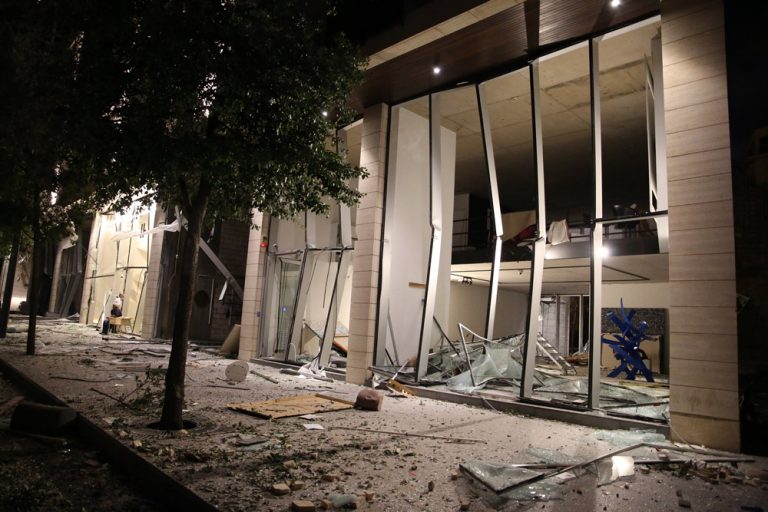Beirut explosion: what caused the blast and how can you help?

What happened in Beirut?
On Tuesday 4 August, just after 6 p.m. an explosion occurred after a fire started at the city’s port. Eyewitness Hadi Nasrallah told the BBC that he saw the fire but did not expect the blast. “I lost my hearing for a few seconds, I knew something was wrong, and then suddenly the glass just shattered all over the car, the cars around us, the shops, the stores, the buildings. Just glass going down from all over the building.”
BBC Arabic reporter Maryem Taoumi was conducting a video interview in Beirut with a member of the Moroccan Agency for Sustainable Energy at the time of the explosion.
لحظة #انفجار_المرفأ أثناء مقابلة أجرتها مريم التومي، الصحفية في مكتب بي بي سي نيوز عربي، مع فيصل الأصيل، مدير المشاريع في الوكالة المغربية للطاقة المستدامة. (تحذير: الفيديو يحوي مشاهد صادمة).#انفجار_بيروت #بيروت #Beirut pic.twitter.com/N6A4UszkgY
— BBC News عربي (@BBCArabic) August 4, 2020
The blast was felt 240km (150 miles) away on the island of Cyprus, with people there saying they thought it was an earthquake. In the aftermath of the blast, chaos fell on the city as ambulances inched their way through heavy traffic to get to the site.
Local media showed people trapped beneath rubble and videos showed wrecked buildings and cars. Hospitals were quickly overwhelmed. The explosion killed at least 100 people and injured more than 4,000. The head of Lebanon’s Red Cross, George Kettani, described it as a “huge catastrophe,” adding: “There are victims and casualties everywhere.”
A search and rescue operation is still under way to locate the more than 100 people missing.
Its heartbreaking news.💔for Beirut. #Beirut_Explosion #Paryforlabnon pic.twitter.com/uEBgmASkaX
— Syed Fasih (@SyedFasih757) August 4, 2020
What triggered the explosion in Beirut?
While an investigation is under way to find the exact trigger which caused the ammonium nitrate to explode, we know that it had reportedly been stored in a warehouse after it was unloaded from a ship impounded at the port in 2013. Lebanon’s President Michel Aoun said that the 2,750 tonnes of explosive material had been stored unsafely.
Ammonium nitrate is a common industrial chemical used mainly as fertiliser in agriculture as well as one of the main components in explosives used in mining. While it is not an explosive on its own, it can ignite if it isn’t stored properly. The site where it is stored has to be fire-proofed, not have any drains, pipes or other channels in which ammonium nitrate could build up. When it explodes, it can release toxic gases including nitrogen oxides and ammonia gas.
Lebanon’s Supreme Defence Council said those found responsible for the explosion would face the “maximum punishment” possible.
What was happening in Lebanon before the blast?
The explosion comes at a sensitive time for Lebanon. With COVID-19 infections on the rise, hospitals were already overwhelmed. Now, they are faced with treating thousands of injured people on top, which only means they will struggle to cope.
The country is also going through an economic crisis. Because Lebanon imports most of its food and stores it in the port, which was mostly destroyed by the explosion, people fear widespread food insecurity to come.
Many buildings and homes were reduced to an uninhabitable mess of glass and debris, leaving residents homeless. President Aoun announced that the government would release 100 billion lira (approximately £50.5 million) of emergency funds. Even with this help, the impact of the blast on the economy is expected to be long-lasting.
The explosion also happened close to the scene of the car bombing that killed Lebanon’s former Prime Minister Rafik Hariri in 2005. A verdict is due on Friday in the trial of four men accused of orchestrating the attack on Mr Hariri at a special United Nations court in the Netherlands.
Even before the blast, tensions were high in Lebanon, with street demonstrations against the government’s handling of the worst economic crisis since the civil war on the one hand, and tension on the border with Israel on the other hand. A senior Israeli official told the BBC that “Israel has no connection” to the explosion in Beirut.
How can you help?
If you’re looking to help those affected by the explosion, start by donating to the Lebanese Red Cross and the UK-based non-profit Impact Lebanon’s disaster relief fund.
ATTENTION: We are calling on the world, our friends, our fellow Lebanese in the diaspora to DONATE to help us provide disaster relief. We will update the page to provide exact details on how your money will be spent. Donate here: https://t.co/eER5BZs8jG #بيروت pic.twitter.com/7mmF0llIaf
— Impact Lebanon (@ImpactLebanon) August 4, 2020
You can also donate to local and international organisations such as food banks and medical charities on the Lebanon Crisis website.





